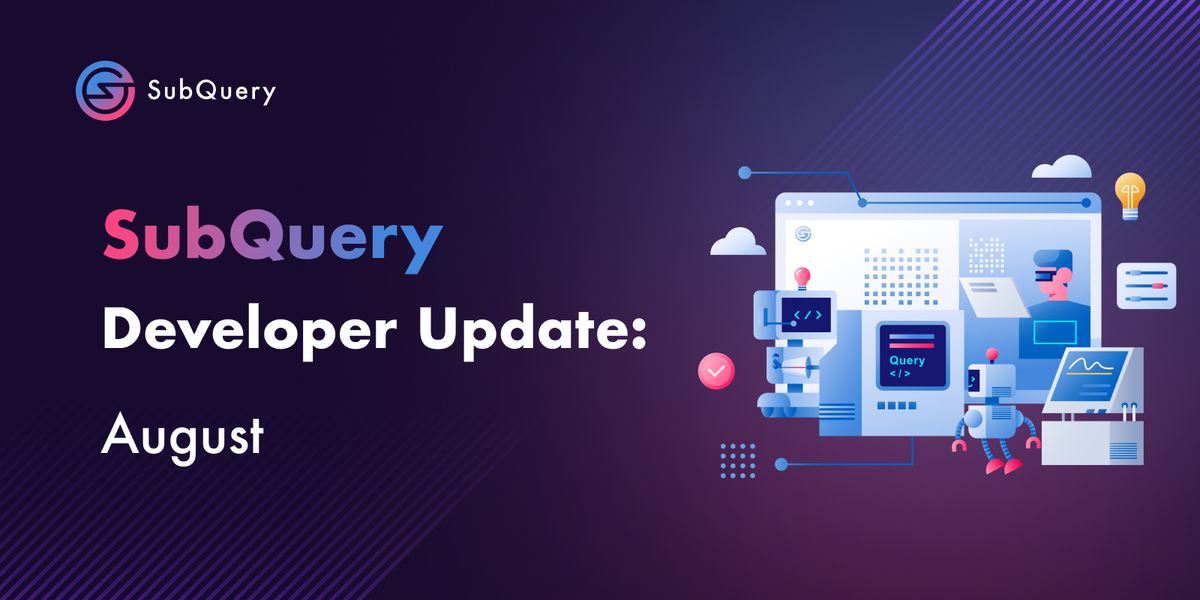SubQuery is a fast & flexible blockchain indexing toolkit that powers hundreds of teams on blockchain networks such as Ethereum, Polygon, Arbitrum, Optimism, Polkadot, Cosmos, Avalanche, and several others. Our goal is to help developers focus on creating their core products rather than spending time and money building their indexing solutions.
Our latest Developer Update highlights the following:
- Develop faster with SubQuery Project Scaffolding
- New Indexing Support for Base
- Open-sourcing most libraries and codebases for our network
- Other improvements to the SubQuery SDK
Develop Faster with SubQuery Project Scaffolding
SubQuery has released a new feature that speeds up the development of SubQuery projects by generating an entire SubQuery project off a single smart contract definition. In short, SubQuery will generate a project manifest and function facades for the selected events or transaction types from your smart contracts during setup, saving you from writing a boilerplate. It simplifies the process and ensures type safety in your project, making it a game-changer for SubQuery developers.
When initialising a new EVM or CosmWasm-based project, you can now optionally select your project ABIs (for EVM projects) or Protobufs (for CosmWasm projects) and then select the events, functions, or transaction types you want to index — SubQuery will handle the rest!
For more information, please find the SubQuery documentation here.
SubQuery Expands Indexing Support to Base by Coinbase
This August we announced indexing support for Base, where developers can benefit from a superior SubQuery indexing experience, including access to the open-source SDK, tools, documentation, and developer support that the SubQuery ecosystem provides. They are also supported in SubQuery’s enterprise-level managed service, which provides enterprise-level infrastructure hosting and handles millions of requests each day.
SubQuery Network Goes Open Source
As SubQuery continues to grow, we have just made our network codebase open-source. There is no better way to increase transparency than to make the codebase available for inspection, review, and contributions as well. It is the power of the community that keeps projects like SubQuery and many other blockchain projects active as we strive for this decentralised future together.
We welcome all contributions, e.g. adding a feature, fixing a bug, suggesting an improvement, or even just fixing typos in our documentation. Please review our contributing guidelines here and view our network projects here.
Other improvements to SubQuery SDK
- We’ve added a new --primary-network-endpoint that allows you to set a primary RPC endpoint that your indexer will try first and prioritise. With our multi-RPC support, we know that many indexers want to set a priority and have SubQuery only fall back to other options when needed
- Significant improvements to the default configuration of our starter projects that make your project lightning quick by default. If you have legacy SubQuery codebases, we suggest incorporating some of the config from our various starter and example repos to take advantage of this (as well as updating your dependencies).
- P.S. Remember to join our Discord and our social channels to stay updated on our latest news and announcements!
Key Resources
- View the GitHub releases page for more information
- Developer documentation
- Discord community (including technical support)
About SubQuery
SubQuery is a leading blockchain data indexer that provides developers with fast, flexible, universal, and decentralised APIs for web3 projects. We empower developers from over 80+ ecosystems including Ethereum, Polygon, Polkadot, Cosmos, Algorand, NEAR, and Avalanche with rich indexed data to allow them to build intuitive and immersive decentralised applications. This blockchain developer toolkit enables developers to focus on their core use case and front-end without wasting time building a custom backend for data processing activities. In the near future, the SubQuery Network will replicate this scalable and reliable solution in a completely decentralised manner.
Linktree | Website | Discord | Telegram | Twitter | Matrix | LinkedIn | YouTube

